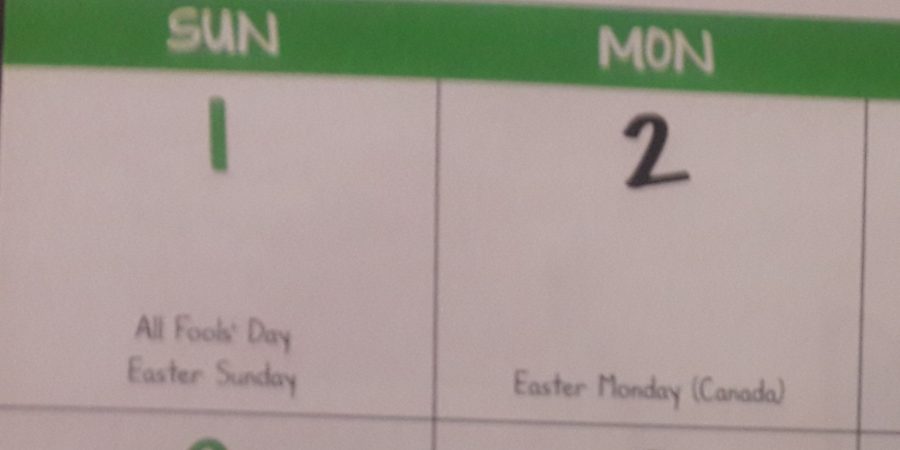Some church calendar confussion
EASTER: Determining a date has proven ‘divisive’

by David Roach
NASHVILLE, March 29, 2018 (BP) — Some Christians have expressed chagrin that Easter and April Fools’ Day fall on the same date this year. But any moderate emotional energy expended contemplating Easter’s date in 2018 pales in comparison to the passion believers brought to dating Easter the first four centuries of church history.
The story of that passion helps explain how Christians have come to calculate Easter’s date.
“Why was the date of Easter such a divisive issue?” said Rex Butler, professor of church history and patristics at New Orleans Baptist Theological Seminary. “First, the centrality of Jesus’ resurrection to the Christian faith made the date of its observance a critical concern. Second, the rituals associated with Easter brought into sharp contrast the differing dates of its observance.
“For example,” Butler told Baptist Press in written comments, “the practice of Lent called for Christians to fast for 40 days before Easter and then to end that fast in celebration of Jesus’ resurrection. Conflict developed when one group of Christians ended their fasting before another group ended theirs.”
By the second century, Butler said, Christians were split between those who observed Easter — “Pasch” as they called it — according to the lunar Jewish calendar to coincide with Passover and those who followed the solar Julian calendar and observed Easter the Sunday following Passover.
Those who calculated Easter with the Jewish calendar came to be known as Quartodecimans — named for the number 14 because Passover begins at the close of the 14th day of the month of Nisan.
At times, the debate was heated.
In the second century, Quartodecimans — centered in Jerusalem and modern-day Turkey — claimed they received their tradition from the apostle John. “Sunday-only” Easter proponents in Rome said their tradition came from Peter and Paul, Butler said. In the final decade of the century, “Roman Bishop Victor I went so far as to excommunicate the Quartodecimans in the east,” though he later recalled the excommunication.
Around the year 200, Hippolytus of Rome devoted a chapter to Quartodecimans in his work “The Refutation of All Heresies,” calling them “contentious by nature,” “quarrelsome” and “wholly uninformed as regards knowledge.”
The fourth-century Synod of Antioch stated that any minister “to exercise his own private judgment to the subversion of the people and to the disturbance of the churches, by observing Easter [at the same time] with the Jews … heaps sin upon himself” and “is the cause of destruction and subversion to many.” Such ministers, the council stated, would be deposed from their ministry along with those who “shall presume to communicate with them.”
In 325, the Council of Nicea had forged a compromise between proponents of lunar and solar calendars: placing Easter on the first Sunday following the first full moon (lunar) after the Spring Equinox (solar).
Making Easter a Sunday every year, wrote Roman Emperor Constantine, was an effort to stop relying on the calendar of the Jews, whose company was “detestable” because they “had soiled their hands with the most fearful of crimes” by crucifying Jesus, “and whose minds were blinded.”
Yet the date of Easter was not completely resolved.
Christians in Rome believed the Spring Equinox fell on March 18. Believers in Alexandria, Egypt, placed it on March 21, 19th-century church historian Karl Hefele wrote. Romans, unlike Alexandrians, also waited a week to celebrate Easter when the full moon following the equinox fell on Saturday.
Those differences, Hefele wrote, finally were resolved in the 8th century, when “the whole of Christendom was united” in its dating of Easter.
A final hiccup occurred, however, in the late 1500s, when Pope Gregory XIII instituted a new Gregorian calendar that correctly assessed a solar year to be 365.242 days, according to a 2008 Christianity Today article. The older Julian calendar put a solar year at 365.250 days.
While the West adjusted Easter to the Gregorian calendar, some jurisdictions in the Eastern Orthodox Church still determine Easter by the Julian calendar. Eastern Orthodox Easter this year is April 8, a week following Easter in the West.
In the end, Constantine’s statement following the Council of Nicea apparently remains a hope more than a reality: “It was universally thought that it would be convenient that all should keep the feast on one day; for what could be more beautiful and more desirable, than to see this festival, through which we receive the hope of immortality, celebrated by all with one accord, and in the same manner?”
The original story can be found at: http://www.baptistpress.com/50619/easter-determining-a-date-has-proven-divisive
Reprinted from Baptist Press (www.baptistpress.com), news service of the Southern Baptist Convention.

David Roach
David Roach is chief national correspondent for Baptist Press, the Southern Baptist Convention's news service. BP reports on missions, ministry and witness advanced through the Cooperative Program and on news related to Southern Baptists' concerns nationally and globally.




Comments are Closed